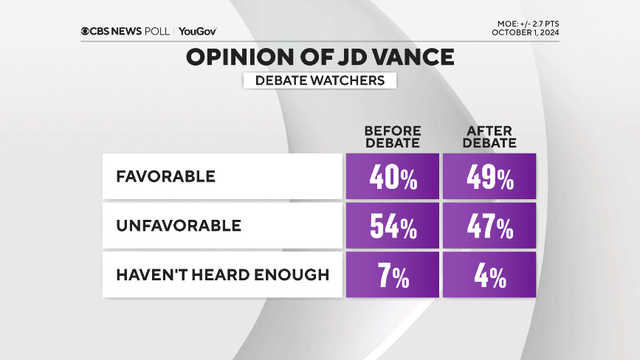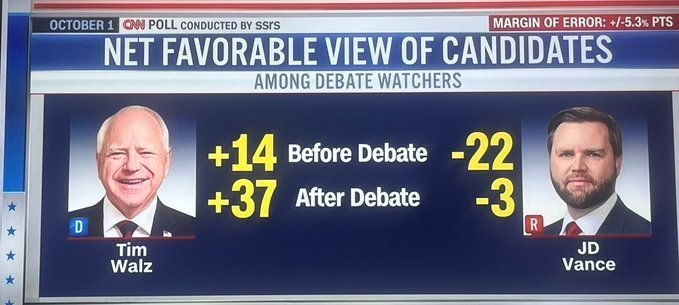Several pollsters have measured a massive spike in approval rating of Republican vice presidential nominee J.D. Vance after a dominating debate victory over Democratic Party challenger Tim Walz on Tuesday.
Several polls and focus groups conducted in the hours following the debate have produced extremely positive results for the Trump-Vance Campaign. Vance cleaned up on social media polls, and was further declared the victor in polls conducted by CNN, NBC News, Fox News and several others.
The debate also appears to have led to a massive spike in Vance’s favorability among voters.
According to a poll conducted by CNN, Vance opened the night with a favorability rating well within the red at -22. After the debate, it had to declined to -3 among the network’s left-leaning viewers, a 19-point swing over the course of the debate.
CBS News/YouGov found that 40 percent of respondents had a favorable view of Vance before the debate. This jumped to 49 percent after the debate, while those who viewed him unfavorably declined by eight points over the course of the night. An additional four percent of respondents remained undecided after the debate.


Several left-wing pundits were also forced to admit that Vance scored a dominating victory over his Democratic rival.
Walz suffered a number of setbacks over the course of the 90-minute debate, including one notable moment where he failed to answer why he lied about his trips to China. The Minnesota governor claimed that he was in the country during the Tiananmen Square protests in 1989, though a report from CNN found the claim to be untrue.
The Democratic Party nominee also declared that he has “become friends with school shooters” in a bizarre moment.
“I think we shouldn’t lose track, I think even in the civility of the fact that J.D. Vance came to this debate to land a bunch of punches, and he did. He landed a lot of punches in between all the niceties and all of that,” said CNN’s Abby Phillip.
She further speculated that Walz was woefully underprepared for the debate. CNN had previously reported that Walz was very nervous about facing off against a “lawyer type” like J.D. Vance and was extremely worried about letting Vice President Harris down.

Following the debate, J.D. Vance’s performance garnered widespread praise from political commentators across the spectrum, signaling a shift in the narrative surrounding his candidacy. Analysts highlighted his ability to remain composed under pressure, delivering sharp and impactful rebuttals while presenting clear policy alternatives to his opponent. Vance’s focus on issues like national security, economic recovery, and border control resonated with a broad swath of voters, particularly independents who were still on the fence.
In contrast, Tim Walz struggled to defend his record on key Democratic policies, and his responses often lacked the sharpness needed to counter Vance’s pointed attacks. One of the most discussed moments was Walz’s fumbled explanation of his foreign policy experience, which became a focal point for critics. His inconsistent statements, especially regarding his travel history, undercut his credibility, giving Vance a clear advantage in the debate’s aftermath.
Social media further amplified Vance’s victory, as hashtags related to his performance trended on platforms like Twitter and Facebook throughout the night. Influential conservative voices praised his command of the issues, while even some centrist commentators acknowledged his debate prowess. Vance’s use of concise, relatable language allowed him to connect with viewers, portraying himself as a pragmatic, solutions-oriented candidate.
The debate also ignited discussions about the broader Republican strategy heading into the final stretch of the election. Many saw Vance’s strong showing as indicative of a larger trend, with the Trump-Vance ticket solidifying its base while making inroads with moderate voters. Conversely, Democrats are likely to reassess their approach, particularly in how they position Walz in future public engagements. His debate performance raised concerns within the party about his ability to effectively counter the Republican narrative, especially on key battleground issues like crime, the economy, and foreign policy.
In summary, the debate marked a significant turning point for J.D. Vance, elevating his standing not just within his party but also among the general electorate. His ability to land decisive blows against Walz, coupled with his rising favorability ratings, positions him as a formidable vice presidential candidate as the campaign moves forward.
